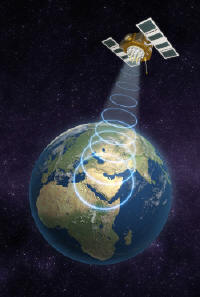 |
In some Middle Eastern countries, more than half the population is under the age of 15.Projections indicate that in the next 22 years, the entire Arab population of about 300 million will double.First time job seekers will require nearly 100 million new jobs over the next two decades according to the World Bank.This is more than the number of jobs created in the region during the past fifty years.However, with the appropriate investment in education, the demographics of the region could be the best gift for its future.In a world where many countries face an aging population problem, an educated-youth population becomes a huge asset.
Consider the benefits of an investment in a geospatial skill training program for Middle East youth.With geospatial skill training, these youth could become productive agents of social change and engines of transformation for their growing economies.And surely a program would also bring benefits to the United States by reducing the appeal of radical, anti-western philosophies while also assisting in developing markets for American geospatial technology products and services.
Kidz Online, a not-for-profit educational organization, is expanding its technology training programs to reach youth in the Middle East.Our U.S. Department of State funded project, Shaqa'iq, profiles success stories of Arabic speaking women and the supportive men in their lives, as the profilees address their education, career and the use of technology.Kidz Online also has a contract with the U.S.Department of Labor's Bureau of International Labor Affairs to combat exploitive child labor via education in the region.
Kidz Online is also expanding the scope of its training program to include geospatial skills for youth in the United States with a grant from the President's High Growth Job Training Initiative.It is now exploring the opportunity to translate its geospatial programming into Arabic to provide skills training to youth in the Middle East.Fostering opportunity for youth in this region is one on the major challenges facing our world today and jobs in the geospatial industry may provide that opportunity.
There is a tremendous need for geospatial technologies and workers in the region, given its strategic importance and resource base.This was made evident at the recent Map Middle East Conference and Exhibition on Geospatial Information, Technology and Applications held in Dubai.Its theme, "geospatial technology and knowledge economy," highlighted the need for local geospatial knowledge and skills so crucial to the economic agenda in the Middle East for the future.
According to the conference program: "The Middle East is one of the most strategic regions of the world and is host to a pool of excellent natural and human resource base that has over the years, spearheaded an outstanding economic and human development for the region.There is a renewed focus in the region for geospatial information and its applications...Nations of the region have started embracing geospatial technologies and sciences assertively.GIS, Remote Sensing, Aerial Photography, GPS are being employed to ensure optimum utilization of natural and man-made resources."
With the largest oil reserves on the planet, the Middle East's strategic importance to the United States is enormous.The oil industry increasingly employs GPS technologies which are integrated into both exploration and extraction operations using sophisticated satellite imagery and high-resolution 3D modeling.Routinely, oil industry professionals use geospatial technologies to perform seismic surveys, surface modeling activities, pipeline routing and environmental risk assessment studies as well as oil-well management.Security monitoring and emergency modelings for oil fields and pipelines are critical functions in this volatile region of the world.
As urbanization increases in the sprawling Middle East, managing development becomes critical.The ability of political leaders to effectively plan commercial and residential infrastructure development will determine the success of their societies.They will need spatial data to provide a path of development for a burgeoning and diverse population attempting to coexist within a finite and increasingly crowded space.Urbanization will exacerbate traffic congestion in teeming cities with a progressively younger and more mobile population. Intelligent transportation technologies are commercially available which have the potential to record position and velocity data of GPS-equipped vehicles and remotely provide real-time images of traffic flows so that commuters can circumvent congested areas.
Remote sensing for infrastructure planning will also play a crucial role in shaping urbanization and managing the growth of Middle East economies.As more powerful data from Earth imaging satellites become commercially available for this geographic region, local governments will have the ability to strategically plan for increases in population density, traffic patterns, and utility demands.These "eyes in the sky" will transmit data for the evaluation of disasters, overpopulation, pollution analysis and other environmental issues.
GIS, GPS and remote sensing technologies will play important roles for the reconstruction of war devastated regions in Iraq and Palestine where an unlimited amount of infrastructure needs have created billions of dollars in projects funded by international aid.These technologies can provide post-war recovery and reconstruction with geospatial intelligence for locating minefields, supporting humanitarian relief operations and identifying infrastructure damage.
In an attempt to provide a gateway to technological advancement and help supply a sense of hope and potential amongst Palestinian youth, Kidz Online and the United Palestinian Appeal are planning to conduct cultural exchange and technology camps for students.Once these students have completed the training, they would become peer instructors and change agents for regional dissemination of their newly acquired skills.
The demand for a skilled geospatial workforce in the Middle East will be vast and continue for decades.This begs the question of whether the pipeline of future geospatial workers will be filled with expatriates or with indigenous talent.A commitment from international donors to the investment in education and skill training for the youth in this region will provide the answer.